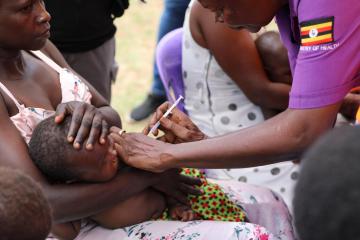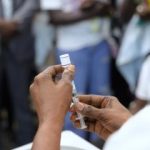Today marks a pivotal moment in Uganda’s battle against malaria, offering hope to families across the country irrespective of where they live. The official rollout of the R21 matrix M malaria vaccine signals a major leap in protecting children from one of Africa’s deadliest diseases. By integrating the vaccine into Uganda’s routine immunization program, this achievement lays the foundation for a healthier future for generations to come.
With support from WHO, GAVI, UNICEF, and other partners, Uganda has become the 19th African country to introduce the malaria vaccine into its routine immunization program. The official flag-off in Apac District in Northern Uganda, marks the largest rollout to date, targeting over 105 high and moderate transmission districts. Apac, with the highest number of mosquito bites globally – more than 1,500 per person annually – underscores the critical need for this intervention.
Malaria remains the leading cause of severe illness and death among young children in Uganda. In 2022, the World Health Organization (WHO) reported that malaria accounted for 40% of outpatient visits, 25% of hospital admissions, and 14% of hospital deaths. In 2023, Uganda ranked among the top five African countries with the highest malaria burden. The R21/Matrix-M vaccine, administered in four doses at 6, 7, 8, and 18 months of age, initially targets children between 6 to 11 months with plans for nationwide expansion.
Malaria’s devastating impact is undeniable, with over 430,000 young African lives lost to the disease annually. Yet, the introduction of the malaria vaccine offers hope, providing a groundbreaking opportunity to reduce these numbers significantly.
Hon Dr Jane Ruth Aceng Ocero, Uganda’s Minister of Health, emphasized the vaccine’s potential to save countless lives. ” The introduction of the vaccine marks a significant milestone in our fight against Malaria. It is expected to prevent at least 800 cases of severe Malaria among children every day and ease the financial burden on families, saving them approximately UGX 15,000 per case that would have been spent on treating severe Malaria,” she stated, urging parents and caregivers to bring their children for vaccination as part of routine immunization services and free of charge.
Since its recommendation by WHO in 2021, the malaria vaccine has proven to be an essential tool in malaria prevention. Uganda now joins 18 other African countries in incorporating the vaccine into their immunization programs. With 2.278 million doses earmarked for distribution across 105 districts, Uganda is prioritizing districts most affected by malaria, ensuring the highest-risk children are protected first.
Administered in four doses – beginning at six months of age and followed by second dose at seven months of age while third dose is given at, eight months and the fourth dose at 18 months. For full protection against severe malaria the child has to receive all four doses and at the right interval. The vaccine offers an additional layer of defense. While it complements other proven malaria control measures like insecticide-treated bed nets and early treatment, it significantly enhances Uganda’s ability to reduce severe malaria cases, hospitalizations, and deaths.
Pilot programs in Ghana, Kenya, and Malawi have already demonstrated the vaccine’s life-saving impact, showing a 13% reduction in mortality and a significant decrease in hospitalizations due to severe malaria. These results highlight the transformative potential of the vaccine in Uganda.
By integrating the malaria vaccine with existing control measures tailored to Uganda’s needs, the country can maximize its impact. This integrated approach ensures that no child is left behind in the fight against malaria.
Grace, a mother of two, expressed her relief: “I’m so relieved to know that my children can now be protected from malaria. I’ve lost relatives to the disease, and this vaccine gives us hope for a healthier future.” John, a father, added, “As a parent, I feel that I’m doing everything I can to keep my children safe. This vaccine is a blessing.”
WHO’s support has been instrumental in guiding Uganda’s efforts. Dr Kasonde Mwinga, WHO’s representative in Uganda, said, “This marks a significant turning point in Uganda’s battle against malaria. The vaccine, now part of routine immunization program, will protect countless children and reduce the disease burden in communities.”
WHO commends the Ugandan government for its leadership and dedication to this effort. Through effective resource mobilization and collaboration with partners, Uganda has demonstrated resolve in the fight against malaria, ensuring that children receive vital protection from this preventable yet deadly disease.





GIPHY App Key not set. Please check settings